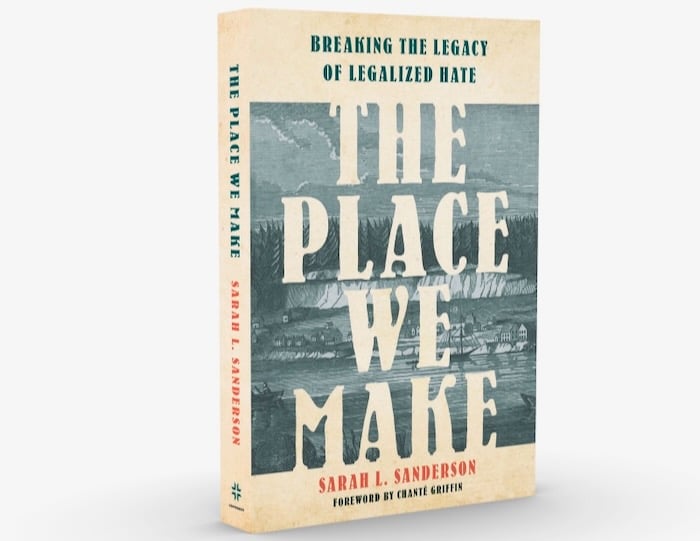Some Recommendations
Racial justice in Oregon, literary farm life in Illinois, fly fishing in Washington, and sabbath-keeping... everywhere.
I'm up to my eyeballs in the new book; just a couple more chapters and the conclusion to go before I can begin reviewing the whole thing and spiral into profound insecurity about how terrible it all is. Just kidding?
Anyway, rather than risk duplicating that half-baked material here, I thought I'd point to a few things I've enjoyed recently.
 First up is an excellent new book by Sarah L. Sanderson coming out next week. In The Place We Make: Breaking the Legacy of Legalized Hate Sarah explores the history behind her home state's legislation which excluded African American citizens from the entire state. While I knew about Oregon's dubious designation as our country's only sundown state, Sarah's choice to explore this history through the experience of Jacob Vanderpool, the only man to have been successfully and legally been exiled from the state, introduces details which force the reader to see how this history includes us, the non-Oregonians, too.
First up is an excellent new book by Sarah L. Sanderson coming out next week. In The Place We Make: Breaking the Legacy of Legalized Hate Sarah explores the history behind her home state's legislation which excluded African American citizens from the entire state. While I knew about Oregon's dubious designation as our country's only sundown state, Sarah's choice to explore this history through the experience of Jacob Vanderpool, the only man to have been successfully and legally been exiled from the state, introduces details which force the reader to see how this history includes us, the non-Oregonians, too.
Sarah is a wonderful writer and I appreciated her willingness to include tender aspects of her own experiences grappling with race and justice. She's provided an example that I hope lots of white Christians will follow in our own communities.
Next up is my friend Tiffany Kriner's new book, In Thought, Word, and Seed: Reckonings from a Midwest Farm. Sadly, for you, this one isn't available until late September. Tiffany, her husband Josh, and their kids moved to a bunch of depleted acres of Northern Illinois farmland a few years back and this collection of essays chronicles the beauty and hardship the decision brings. (If you're local, you can buy meat from their farm. We purchased a delicious ham a few years back, made even tastier by the knowledge of how the Kriner's raise their animals with care.) Because the author is a literature professor, there's also a bunch of references to Baldwin, Virgil, Toni Morrison, George Eliot, and others. Also, Holy Scripture. I'd situate this little book with the essays of Barry Lopez and Kathleen Norris' Dakota and even if that doesn't mean anything to you, you still ought to pick this one up this fall.
I had a nasty summer head cold this week and one of the evenings I was stuck in bed, trying not to infect my family, I watched Martin Doblmeier's documentary about the Sabbath. Doblmeier was behind a film about Dietrich Bonhoeffer that I really appreciated when it came out a number of years ago so I was interested in how he'd portray sabbath-keeping.
He interviews a number of different faith leaders to fill in a well-rounded picture of how people think about the Sabbath: Jewish Rabbis, Christian clergy (including, Seventh Day Adventists), and a Muslim Imam. He also includes some academics - Norman Wirzba from Duke is one - who have thought a lot about the environmental impacts of keeping sabbath. It dragged a bit in the middle for me. Still, I hope a bunch of people see this film. Heaven knows our society could use more people committed to intentional contentment.
Another: This week I bumped into this wonderful article by Derek W. Taylor in Plough. Derek writes about fishing in the rivers of Washington but he's really thinking about what it means to be a steward of creation in a world where there's very little to conserve any more.
The logic of care implied by stewardship is a welcome improvement over the logic of domination. But for me, questions remain. What might stewardship mean in my watershed, where the fish are already gone?
Or put more bluntly: How do we steward something we have destroyed?
We need more of Derek's sober attention to the difficult circumstances we've made for ourselves. We also need his willingness to see beauty amidst the wreckage and to imagine how we might nurture that beauty, even now.
And finally, Richard Wilson is an author and member of our church. In his most recent newsletter Richard writes movingly about the "reticence within our educational institutions to teach an unvarnished truth to the next generation."
As my fingers brushed against the edges of folders within the bin, a photograph surfaced – an image of a youthful boy, his countenance mirroring my own tender age, dressed impeccably, his smile a nuanced reflection of hope. Eager anticipation fueled my imagination. I envisioned tales of pioneering scientific breakthroughs or unparalleled athletic accomplishments. Yet, as words flowed from the pages before me, the narrative took a haunting turn. A grim tale unfolded, one steeped in unspeakable horror, the tendrils of racial violence, and a sorrow so profound it defied the boundaries of comprehension. The air around me seemed to change, heavy with the weight of a tragic past. The young boy in that photograph bore a name – Emmett Till.
My thanks to Richard and each of these authors and filmmakers for their gifts of beauty and honesty. Have a great weekend.